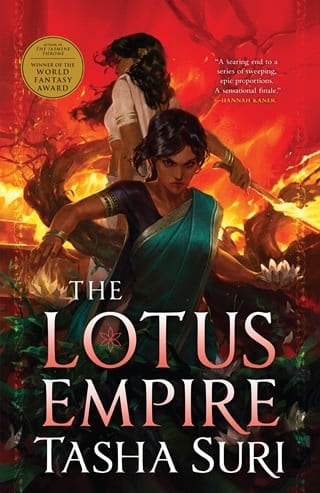Chapter 32 Rao
RAO
Rao woke and fell unconscious and woke again. He was being dragged through snow; he was in a tent, surrounded by the smell of warm bodies and smoke; he was being forced to drink something warm and sweet that made the shivers in his body fade and his consciousness fade once more too. When he woke after more time than he cared to think about he saw things in flashes: a circle open to the sky, snow swirling in and smoke rising out; blurred figures in long wool robes; walls of dark canvas. Then he felt the warmth of a body close to his own. The body kneeled.
“Raise your head to the firelight,” a low voice ordered. There was a finger under his chin, gently urging his head up. There was a man in front of him with pale, hawkish eyes. Behind him in the tent a campfire burned.
“Perhaps I imagined it,” the man murmured. His thumb came to rest beneath Rao’s left eye. “I saw two fools in a storm. Strangers in Dwarali clothing. I thought of letting my soldiers shoot them—and then I saw your eyes. I thought they glowed like flame. Was it a trick of moonlight on snow, Prince Rao?”
“Kai Ehsan,” Rao said croakily, dredging the name somehow from his skull—from a fresh memory of snow, moonlight, a lowered bow. “You did not. The nameless god guided me here.”
“And why did your god guide you here?”
“To seek a ruby,” said Rao. There seemed no worth in concealing the truth. Yelling about his vision had saved his life, after all. “But it may not be a ruby. The nameless showed me—snow, and blood rising from inside it.”
A strange look passed over the man’s face. For a moment he did not speak.
“I believe you,” he said finally. “Only a fool following a god would walk to his death in snow.” He released Rao’s face. “You no longer look like you’re going to perish, Prince Rao. That is good.”
“The woman with me—”
“She is recovering,” said Kai Ehsan. “If you can stand unaided, you can speak to her yourself.”
It wasn’t easy, but Rao rose to his feet. He took a moment to regain his balance and take in his surroundings. His weapons were gone. There were no chakrams at his wrists or daggers at his waist. He was wrapped in a blanket of fur and embroidered wool. One staggering step forward, then another, and he finally saw Sima on the other side of the fire, gray-faced and bundled in a mound of blankets so thick she looked like a swaddled-up infant.
The sight of her gave him the strength to stumble to her side. She mouthed his name, then mouthed a curse so vile that it made him laugh in surprise and then laugh again in relief as he lowered himself to his knees in front of her.
“Sima,” he said, his voice rough. He clasped her hands in his, drawing them out of her cocoon of blankets. They were very cold. “I’m so very sorry.”
“N-no need,” Sima managed. “W-we’re both idiots.”
One of the women clucked at him and batted his hand away.
“Bring your hands closer to the fire,” she instructed Sima, who complied.
“My sisters,” the kai said, nodding to the women. “Bahar, Qutlugh.”
“You’re welcome here, Prince Rao of Alor,” the younger of the two women said. The elder nodded in agreement.
The leader of the Jagatay—that was what the term kai denoted, or so the scraps of knowledge Rao had gained in the Lal Qila’s library had told him—placed a hand on Rao’s shoulder. “Rest,” he said. “My sisters will watch over you.”
“Thank you,” Rao said, looking from the two women to their brother. “For your kindness, and your compassion. I am indebted to you.”
“I do not need thanks,” said Kai Ehsan. “But I will take your debt. When the storm dies and you are recovered, Prince Rao of Alor, I am going to ask you for knowledge. And you will answer honestly.”
The storm eased eventually. No more snow flurried in through the roof, and Rao’s shivers had stopped. He and Sima didn’t talk in the hours that passed—not with eyes on them. But eventually Sima wriggled her hand free from her blankets and touched her knuckles to his arm. That comforted him.
One of the kai’s sisters—Qutlugh—stirred, turning toward the entrance of the tent with narrowed eyes as the tent flap drew back.
Kai Ehsan stood at the entrance, the sky and ground blue-white behind him. “I want you to come with me,” the kai said. “It is time for us to talk.”
Rao’s gaze turned to Sima. She looked back.
“She’ll be safe with my sisters,” said the kai. “Come.”
“Go,” Sima said croakily. “I’ll be fine.”
So Rao rose to his feet and followed.
“You’ll like this wine,” Ehsan said, as Rao sat across from him at the low table in the kai’s own tent. The fire was burning low, but the closed tent and the furs and blankets around them kept the chill at bay. “This is my last bottle,” Ehsan said as he poured. “My grandfather lost his eastern ancestral lands, where our grapevines grew, in war with his cousin. Now my heritage is reduced to this. Two cups of sweet liquor.” The bottle hit the table with a soft thud. “My father later lost his fruit orchards to a Babure kai,” Ehsan continued, pushing the cup to Rao, who took it obediently. “But I never cared for peaches, so it was no great loss to me, beyond my pride.” A beat, and then he murmured, “The losses afterward were harder.”
Rao touched the cup to his lips. He didn’t drink deeply, but what little he tasted was rich, warming. It was like nothing he’d had before.
“What knowledge do you want from me?” Rao asked, lowering his cup.
A thin-lipped smile from the kai, who lowered his own cup.
“I want knowledge of the empire,” he said. “Of Parijatdvipa.”
Knowledge could be many things. Gossip. Secrets. And Rao knew more about Malini’s court—and her army, and her secrets—than he would ever share with a stranger.
“I know you trade with the Lal Qila,” said Rao. “You speak Zaban. You know as much as I could tell—perhaps more.”
“A few Babure tribes trade with the fort,” Kai Ehsan corrected. “And only sparingly. Only when they seek more weapons to fight us.” Another thin smile. “You understand, perhaps. The Lal Qila arms one impoverished border tribe against another, ensuring that we are too busy killing one another to fight the Dwarali or turn our faces toward the empire. A clever defense strategy, but not one that has benefited me or my kin. I know many of your languages because my people, like yours, believe in the value of learning.” A fluid shrug of a single shoulder. “A common soldier could bring me knowledge I don’t have. But I am sure you, as a prince , can give me truth as precious as gold.”
“I must apologize,” Rao said, his voice steady despite the pounding of his heart. He was painfully aware of how vulnerable he and Sima were here in this camp where they did not belong. “But I will not share any knowledge that places my empire in danger or works against the lord and lady of the Lal Qila. If that is what you seek, I cannot pay my debt.”
“Did the lord and lady of the Lal Qila allow you here? Surely not, or you would have approached my camp with an army. You already act against them.” Ehsan leaned forward, his hawkish eyes unblinking. “Nothing I ask you to share with me will harm your empire. I am not going to torture you for knowledge—there’s no need to look so hunted, Prince Rao—and there is no need for you to withhold it from me. I have something you want, and all I ask in return is to know how the empire fares beyond the border of mountains and fort. Tell me about your new empress. Tell me what danger sends you running to follow a god’s voice.”
He was dangerously convincing.
“What do you have that I want?” Rao asked, trying to buy time.
“The end to your quest, of course,” Ehsan said. “The truth of your ruby. Though we call it heart’s shell.”
Rao’s breath caught like a claw in his throat. For a moment a vision of fire, an insistent call, burned behind his eyes, then faded to smoke.
“You are a desperate man,” Ehsan said, low. “I see in you an echo of myself. I am a man with barely enough food to feed his soldiers. My people are decimated. I know what desperation looks like. What hunts your people? What beast hounds Parijatdvipa? Tell me.”
Rao held his cup of wine simply to ground himself. Cold metal under his hands. His own blood thundering in his ears.
“There is a danger in Parijatdvipa,” Rao said. There was a hush inside the tent. Nothing but the crackle of the low fire and the light of it glancing off the planes of Ehsan’s attentive face, his narrowed eyes. “Yaksa—ancient beings—are returning. And a strange rot destroys our crops and our people. Those beings want to destroy us. Our empire. And it is my duty to find a way to save us all. I hoped my vision would be an answer.”
Ehsan’s smile faded. His expression was solemn now.
“We were meant to meet. I prayed for an answer to my desperation, and here you are.” He stood abruptly. “Come with me. And put on this coat, Prince Rao,” Ehsan ordered, offering him a lined jacket as he drew on his own, drawing the high collar tight at his throat. “It’s bitter where we’re going. Cold that rises from inside your bones. You’ll need all the warmth you can get. And one last thing…”
Rao paused as the man briskly drew out a cloth and held it up to Rao’s eyes.
“You will have to trust me,” the kai said.
Rao closed his eyes and allowed himself to be blindfolded.
He would never have been able to chart the route if asked. He was led on a winding path: up a rough surface, then down again; over soft ground onto jagged stone. He felt foolish and uncomfortable, convinced at any moment that he would fall and crack open his skull. But Ehsan led him calmly, giving straightforward instructions even as he steered Rao with hands at his upper arms.
“Lower your foot. There, good. You likely know little of the politics of people beyond your empire’s borders,” Ehsan said mildly as he urged Rao to follow him down a steep incline. “But among our tribes, land can be gained or lost in a generation. If you are not strong enough, cunning enough to keep it, then it will be taken by wiser and stronger leaders. That is why my tribe is so reduced. My father’s and grandfather’s failures haunt us, and I… have not been able to change our fortunes.” His voice tightened on those last words, restraining feeling. “Turn to your left. There is a wall there—stone. Hold it for balance.”
“Where have you brought me?” Rao asked.
“To the heart’s shell,” Kai Ehsan said, putting a hand on Rao’s shoulder, urging him forward. “My father could not sell this knowledge, nor could it be stolen from him. No one knew it had any worth to a prince of Alor.” Amusement in Ehsan’s voice. “The location of this mine was passed to me, from father to son. It is my inheritance.”
As they descended, Rao felt the air change, growing heavier. Even without his sight, Rao was sure they were under the earth, the weight of mountains above them. He desperately wanted to peel his blindfold off, but he resisted.
“Have you heard of the philosopher Sunata, Prince Rao?”
“Everything is the void,” Rao said promptly. Ehsan chuckled.
“As Sunata espoused—we believe in the void, the great nothingness. And we believe that the void is home to innumerable gods.” Ehsan’s hand circled his arm again, drew him onto ground that crunched underfoot, rocky and uneven—then abruptly, suddenly, as smooth as rainwashed stone. “We know of your yaksa because my ancestors feared them once too. How could they not? But they prayed to the void, to any benevolent immortal listening in the dark, and received a warning from a kind god: All magic from the void has a terrible price. All magic can only touch the world for so long before it twists the world and itself into monstrous shapes. So one of my ancestors, a great kai, made a sacrifice. He meditated, and strengthened his mind and transformed his body by sheer will alone into weapons to hold the yaksa and all dark magics at bay.”
Rao felt a tug at the back of his skull. The blindfold was removed.
Disoriented, Rao blinked until his vision adjusted to the flare of the single torch held in Ehsan’s hand. The sight in front of him made his breath stop in his throat.
Ehsan’s forefathers might have lost their vineyards and orchards, but here lay a far more powerful crop. He could see no bodily remains of a long-dead ancestor, but he could see strange stones fused into the vast walls of the cavern around him. The stones were blooming like flowers of rock—fistlike, curled shapes by the dozens, each a fragile weft of black stone.
“Heart’s shell,” said Ehsan, holding it to the light of the torch in his left hand. In the glow of his left hand one of those dark, fragile stones gleamed a liquid black as deep as blood. “It was used by my people, in the Age of Flowers. It negates the strength of the yaksa, traps them, and reduces them. Take it.”
Rao took a piece of stone.
Heart’s shell. Empty. A hollow thing, light and strange in his hand. He gazed at it and felt no magic inside himself. No light, no voice from the void. He was entirely empty. Entirely human in a way he realized he had never been in his whole life.
There were no voices inside his skull but his own.
“What proof do I have that your stone acts as you say?” Rao asked. His voice shook faintly.
“None but what you feel now,” Ehsan said. “None, but that your god guided you here, and guided me to let you live. I prayed for help. I prayed to the void, hoping something benevolent within it would answer; perhaps it was your nameless god who heard me and brought us together.” Ehsan took a step closer. “I knew we were meant to meet,” Ehsan said, hushed. “When I saw your eyes, I knew. You were my answer. And now, ah—your eyes are lightless.” Humor in his voice, and awe. “You look like a mortal man, untouched by fate.”
Rao shook his head, wordless. The nameless had never filled his eyes with light before Aditya’s death. No priest of the nameless had ever spoken of that power. The nameless’s power lay in prophecy—in names and messages that steered the heart.
It was Aditya that Rao thought of when he thought of light. Aditya and fire.
On the heels of that thought came a suspicion, a fear—what if it was not the nameless who spoke to him at all, but something else—a being of fire, of light, a being wearing Aditya’s voice?
“I… do not know,” Rao said, his voice a little raw. “Perhaps two gods work through me, or even a dozen.”
Ehsan’s mouth quirked into a smile. He thought Rao was jesting with him.
“Perhaps all the gods of the void share one cause,” Ehsan agreed. “Perhaps they seek to help us, or perhaps they seek to use us. But all that matters to me is whether you will help me, Prince Rao, in return for a supply of heart’s shell to fight your yaksa.”
“How can I help you?”
“I am tired of war, and tired of running,” Ehsan replied. “My people need peace. In return for a supply of heart’s shell, I want land for my people. I demand a place for us in the empire. A home we may keep for generations.”
“You ask a high price,” Rao said evenly, “for something we need to survive.”
“I am asking for a chance to survive in return for giving your empire the same chance,” said Ehsan. The light of his lantern painted whip marks of gold across his face. “We both know that well. And you may refuse me, of course. But I promise you, Prince Rao, you will never find the heart’s shell again. Even my own sisters do not know the way to this mine. That knowledge is passed from father to son, and only I possess it. I would die to keep it in my hands, and my hands alone. But give me what I ask for, and your empress shall have all the heart’s shell she desires. So, Prince Rao. Will you bargain on your empress’s behalf?”
Whether the nameless had brought him here, or another being in the void Sunata had once written of, there was only one answer Rao could give. He had come here to save Parijatdvipa, and to stop Malini from burning.
He carefully curled his fingers around the heart’s shell in his palm.
He would not return to Malini empty-handed.
“I can,” Rao said steadily. “Let us return to your camp, Kai Ehsan, and discuss terms. I’ll put the blindfold on myself.”
 Fullepub
Fullepub 



